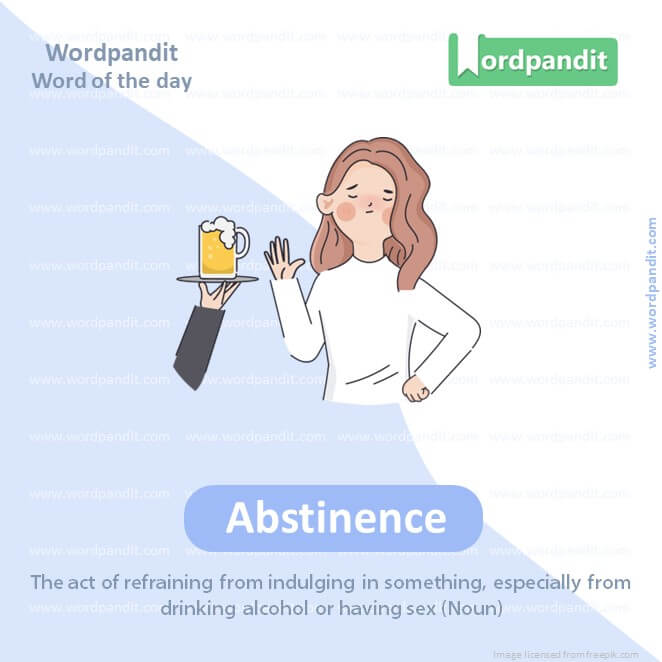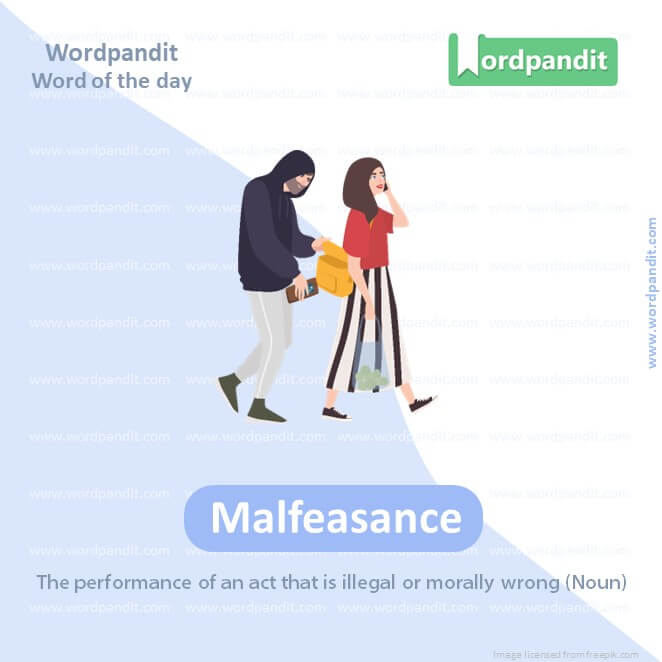Daily Vocabulary Words: List of Daily Used Words
Hi there. Welcome to this special section @ Wordpandit.
Our endeavour here is straightforward: highlighting important daily vocabulary words, you would encounter in The Hindu. This is your repository of commonly used words; essentially, we are posting a list of daily used words. Hence, this has significant practical application as it teaches you words that are commonly used in a leading publication such as The Hindu.
Visit the website daily to learn words from The Hindu.
WORD-1: Chariness
CONTEXT: The Court has opted to subordinate petitioners’ entreaties to protect larger public interest to its chariness to substitute “its own wisdom over the regulatory policies” of the Securities and Exchange Board of India.
SOURCE: The Hindu
EXPLANATORY PARAGRAPH: Chariness means being very careful about doing something, especially because you think it might be wrong or harmful. It’s like when you are very cautious about touching a hot stove because you know it can burn you.
MEANING: The quality of being careful, cautious, and wary (Noun).
PRONUNCIATION: CHAIR-ee-ness
SYNONYMS: Cautiousness, Wariness, Prudence, Vigilance, Circumspection.
USAGE EXAMPLES:
1. Her chariness about investing in the stock market saved her from a big loss.
2. His chariness around strangers is understandable given his past experiences.
3. The chariness she showed in signing the contract was due to her meticulous nature.
4. The traveler’s chariness in a new city kept him safe.

WORD-2: Pertaining
CONTEXT: the determination of possible violations pertaining to minimum public shareholding and related party transactions.
SOURCE: The Hindu
EXPLANATORY PARAGRAPH: Pertaining is a word that means about or related to something. For example, if we talk about things pertaining to the kitchen, we are talking about things that are used in the kitchen or are about the kitchen.
MEANING: Relating to or having a connection with something (Verb).
PRONUNCIATION: per-TAIN-ing
SYNONYMS: Concerning, Regarding, About, Relating to, Connected with.
USAGE EXAMPLES:
1. The documents pertaining to the case were submitted to the court.
2. She has knowledge pertaining to computer programming.
3. The rules pertaining to club membership are strict.
4. All inquiries pertaining to the event should be directed to the organizer.

WORD-3: Conglomerate
CONTEXT: the decision to leave the crucial question of SEBI’s perceived tardiness in investigating allegations of corporate malfeasance and market manipulation by a large conglomerate back to the remit of the very same watchdog hints at a degree of judicial abstinence that may only undermine the larger public good.
SOURCE: The Hindu
EXPLANATORY PARAGRAPH: Conglomerate is like when you mix lots of different things together to make one big thing. Imagine putting different kinds of candies into one big bowl; that’s like a conglomerate.
MEANING: A large corporation formed by merging several companies or a mixture of different things (Noun).
PRONUNCIATION: kuhn-GLOM-er-it
SYNONYMS: Corporation, Combination, Aggregate, Amalgamation, Mixture.
USAGE EXAMPLES:
1. The conglomerate owns several smaller companies.
2. Rocks in the area are mainly conglomerate formations.
3. He works for a multinational conglomerate.
4. The festival was a conglomerate of various cultural activities.

WORD-4: Abstinence
CONTEXT: the decision to leave the crucial question of SEBI’s perceived tardiness in investigating allegations of corporate malfeasance and market manipulation by a large conglomerate back to the remit of the very same watchdog hints at a degree of judicial abstinence that may only undermine the larger public good.
SOURCE: The Hindu
EXPLANATORY PARAGRAPH: Abstinence means not doing something that you might want to do. It’s like when you decide not to eat any candy because you want to be healthy.
MEANING: The act of refraining from indulging in something, especially from drinking alcohol or having sex (Noun).
PRONUNCIATION: AB-stuh-nens
SYNONYMS: Temperance, Sobriety, Self-restraint, Refraining, Forbearance.
USAGE EXAMPLES:
1. Abstinence from smoking is essential for good health.
2. The program promotes abstinence from drugs.
3. Many people practice abstinence during religious observances.
4. His abstinence from alcohol improved his lifestyle.

WORD-5: Malfeasance
CONTEXT: the decision to leave the crucial question of SEBI’s perceived tardiness in investigating allegations of corporate malfeasance and market manipulation by a large conglomerate back to the remit of the very same watchdog hints at a degree of judicial abstinence that may only undermine the larger public good.
SOURCE: The Hindu
EXPLANATORY PARAGRAPH: Malfeasance is when someone does something wrong, especially someone in a position of power, like a leader doing something bad or illegal.
MEANING: The performance of an act that is illegal or morally wrong (Noun).
PRONUNCIATION: mal-FEE-zuhns
SYNONYMS: Misconduct, Corruption, Wrongdoing, Impropriety, Dishonesty.
USAGE EXAMPLES:
1. The official was accused of malfeasance in office.
2. Malfeasance in the company led to its downfall.
3. Investigations revealed malfeasance by the politician.
4. She was fired for malfeasance and misuse of funds.
WORD-6: Provocations
CONTEXT: Iran should not walk into the web of provocations set by its rivals
SOURCE: The Hindu
EXPLANATORY PARAGRAPH: Provocations are things that make someone angry or upset. It’s like when someone keeps teasing you until you get really mad.
MEANING: Actions or words that are meant to make someone angry or upset (Noun).
PRONUNCIATION: prov-uh-KAY-shuns
SYNONYMS: Incitements, Challenges, Taunts, Stimuli, Goading.
USAGE EXAMPLES:
1. The child’s constant questions were gentle provocations.
2. He responded calmly despite the provocations.
3. Their rude remarks were clear provocations.
4. The team faced several provocations from the opposing fans.
WORD-7: Restraint
CONTEXT: It should show restraint and focus on strengthening internal security.
SOURCE: The Hindu
EXPLANATORY PARAGRAPH: Restraint means holding back and not doing something, even if you want to. It’s like when you really want to eat a cookie before dinner, but you wait until after your meal.
MEANING: The act of controlling one’s emotions or actions; self-control (Noun).
PRONUNCIATION: ree-STRAINT
SYNONYMS: Self-control, Moderation, Discipline, Constraint, Inhibition.
USAGE EXAMPLES:
1. She showed great restraint in not answering back.
2. The teacher urged the students to exercise restraint.
3. Restraint is necessary to maintain professional decorum.
4. The situation called for considerable restraint.
WORD-8: De-escalation
CONTEXT: This calls for a de-escalation of the current regional crisis.
SOURCE: The Hindu
EXPLANATORY PARAGRAPH: De-escalation is like calming down a situation. Imagine two friends who start arguing; if they stop yelling and start talking calmly, that’s de-escalation.
MEANING: The process of reducing the intensity or severity of a conflict or situation (Noun).
PRONUNCIATION: dee-ES-kuh-lay-shun
SYNONYMS: Reduction, Diminution, Cooling-off, Alleviation, Moderation.
USAGE EXAMPLES:
1. The diplomat was skilled in de-escalation of tensions.
2. De-escalation techniques are important in conflict resolution.
3. The police were trained in de-escalation strategies.
4. Effective de-escalation can prevent violence.
WORD-9: Deteriorated
CONTEXT: the number of private colleges grew and quality deteriorated.
SOURCE: The Hindu
EXPLANATORY PARAGRAPH: Deteriorated means something getting worse over time. Like when a toy breaks more and more as it gets old.
MEANING: To become progressively worse (Verb).
PRONUNCIATION: dih-TEER-ee-oh-ray-tid
SYNONYMS: Worsened, Declined, Degraded, Decayed, Degenerated.
USAGE EXAMPLES:
1. The building has deteriorated over the years.
2. His health deteriorated after the accident.
3. The relationship between the two countries deteriorated.
4. The machine deteriorated due to lack of maintenance.
WORD-10: Articulation
CONTEXT: That is a very good articulation as far as the autonomy of higher education is concerned.
SOURCE: The Hindu
EXPLANATORY PARAGRAPH: Articulation is like speaking or explaining something very clearly. It’s like when you talk so that everyone can understand you easily.
MEANING: The clear and precise pronunciation of words or the act of expressing ideas clearly (Noun).
PRONUNCIATION: ar-tik-yuh-LAY-shun
SYNONYMS: Enunciation, Expression, Elucidation, Clarification, Diction.
USAGE EXAMPLES:
1. Her articulation of the plan was impeccable.
2. He is known for his clear articulation of complex ideas.
3. Articulation is important in public speaking.
4. The teacher emphasized the importance of good articulation in speech.
Vocabulary SSC
Navigating the path to success in competitive examinations like the Staff Selection Commission (SSC) triggers a keen focus on ‘vocabulary SSC’. This collection of words, often prominent in SSC examinations, holds paramount importance, and forms a significant part of a candidate’s linguistic preparation. However, mastering ‘vocabulary SSC’ is a process that requires deliberate strategy and dedication.
To begin the journey with ‘vocabulary SSC’, a structured learning regime is key. Break the learning process into manageable chunks. Concentrate on a set number of words each day. This steady, consistent approach reduces the risk of burnout and enhances long-term retention of vocabulary.
The strategic use of memory aids can significantly boost the learning of ‘vocabulary SSC’. Utilize flashcards, memory apps, or even create personal mnemonics to help remember each word and its meaning more effectively. Associating a word to a personal event or object creates a lasting mental connection, making recall easier.
To truly master ‘vocabulary SSC’, it’s crucial to engage with the words in different contexts. Incorporating the words into daily reading and writing practices provides exposure to their usage in varied situations. This practical application reinforces the understanding of ‘vocabulary SSC’, enhancing the ability to employ these words accurately in the exam setting.
Regular revision is a must when preparing ‘vocabulary SSC’. Spaced repetition, interspersing the study with regular breaks, and regularly revisiting the words learned, ensures the words stay firm in your memory, ready to use when needed.
In essence, preparing ‘vocabulary SSC’ is an exercise in action-oriented constant learning. Strategic use of learning tools, practical application, and regular revision are key aspects of getting a grip on ‘vocabulary SSC’. As you stride through this process, you inch closer to acing your SSC examinations with an enriched vocabulary and boosted confidence.













